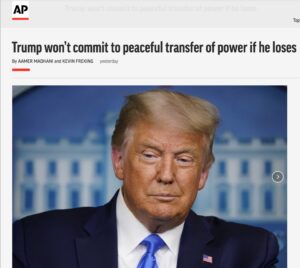On our way to North Norfolk today, we came on a flower we’d never seen before on a roadside verge.
This is one of the (tiny) flowers, shot with a Summilux 28mm on macro setting.
Quote of the Day
”Pray, good people, be civil; I am the Protestant whore.”
- Nell Gwyn, the actress who became Charles II’s mistress. She is supposed to have said it when her carriage was besieged by an angry mob who thought she was the King’s unpopular Catholic mistress, Louise de Kérouaille.
Musical alternative to the morning’s radio news
Dougie Maclean & Guests – Caledonia
So why is this front-page news now?
It would be news if a normal politician — or indeed a normal person — said it. But Trump isn’t normal — and surely we all knew that by now. If a mafia boss were elected president and began behaving like a mafia boss, then nobody would be surprised. They might be outraged or alarmed, but surprised? Not in the least. Trump is a like a low-grade mafia boss with a short attention span. Of course he will dispute the results if he loses the election. Goddam it, he disputed the results in the election that he won!
The unrelenting horizonlessness of the Covid world
Eerie and possibly insightful essay by Nick Couldry and Bruce Schneier, who needs no introduction.
Six months into the pandemic with no end in sight, many of us have been feeling a sense of unease that goes beyond anxiety or distress. It’s a nameless feeling that somehow makes it hard to go on with even the nice things we regularly do.
What’s blocking our everyday routines is not the anxiety of lockdown adjustments, or the worries about ourselves and our loved ones — real though those worries are. It isn’t even the sense that, if we’re really honest with ourselves, much of what we do is pretty self-indulgent when held up against the urgency of a global pandemic. It is something more troubling and harder to name: an uncertainty about why we would go on doing much of what for years we’d taken for granted as inherently valuable.
They think we’re suffering from Acedia. Eh? Apparently it was a malady that plagued many medieval monks. It’s a sense of no longer caring about caring, not because one had become apathetic, but because somehow the whole structure of care had become jammed up.
It’s here, moving back to the particular features of the global pandemic, that we see more clearly what drives the restlessness and dislocation so many have been feeling. The source of our current acedia is not the literal loss of a future; even the most pessimistic scenarios surrounding Covid-19 have our species surviving. The dislocation is more subtle: a disruption in pretty much every future frame of reference on which just going on in the present relies.
Moving around is what we do as creatures, and for that we need horizons. Covid has erased many of the spatial and temporal horizons we rely on, even if we don’t notice them very often. We don’t know how the economy will look, how social life will go on, how our home routines will be changed, how work will be organized, how universities or the arts or local commerce will survive.
What unsettles us is not only fear of change. It’s that, if we can no longer trust in the future, many things become irrelevant, retrospectively pointless. And by that we mean from the perspective of a future whose basic shape we can no longer take for granted. This fundamentally disrupts how we weigh the value of what we are doing right now. It becomes especially hard under these conditions to hold on to the value in activities that, by their very nature, are future-directed, such as education or institution-building. That’s what many of us are feeling. That’s today’s acedia.
That rings a bell. When a loved one becomes terminally ill, for example, you discover that day-to-day living becomes harder because the future has become both certain and uncertain. It’s very disabling.
Thanks to Charles Arthur for spotting it.
The NHS Test and Trace app has two flaws: QR codes and people
As a conscientious citizen (note: not ‘subject’ — I’m an Irish citizen rather than a British subject) I downloaded the app and it’s now running on my iPhone.
Nicole Kobie has an interesting piece in Wired about it, based on the experiences of people in Newham, which was one of the two areas in the country where it’s already been trialled.
The trials were clearly necessary and useful because they’ve highlighted some important areas of potential difficulty
Conflicting QR codes are one of several problems raised by the contact tracing app, alongside residents having phones too old to use the app, language challenges in this diverse area, and distrust of the government.
A key feature of the app is that it is supposed to let you check in to a venue by scanning an official NHS QR code displayed in the premises you are trying to enter. But Newham residents told WIRED that they’ve barely seen any of the official NHS QR codes in shops or restaurants. [This could be because the residents were effectively Beta-testers for the app and the QR codes would not have been widely distributed.]
Others say they’re confused as to whether a QR code on the door is the right one to scan or not, as existing contact-tracing systems also use the codes – just wait until these codes are ubiquitous and scammers start putting up false ones. And some residents reported that the QR code throws up an error message in the app or simply takes too long to scan, causing queues to enter a shop — hardly ideal in these times of social distancing. “Although the app looks good, if I can’t use the QR scanner, it defeats the object of the app’s purpose,” wrote one app reviewer on Google Play.
Another challenge was downloading the app.
Residents were sent out a detailed, four-page letter with instructions on how to install the app and use one-time codes to activate it for the trial, which residents said was off-putting – especially so for those who don’t speak English as a first language. The council has pushed for the app and online advice for it to be available in several languages, including Polish, Gujarati, Urdu and more, but as Fiaz notes, Newham has more than 100 languages and dialects spoken locally.
And then there’s the age of your smartphone…
It only works on recent smartphones, running Android 6.0 or iOS 13.5 later; that’s iPhone 6S and newer. However, that risks leaving out people with older phones, in particular those without the money to buy a newer one. …
Apparently Age UK is warning that this could leave those most at risk of Covid being treated as “second-class citizens.” Another way of putting it is that it’s just another illustration of how the pandemic is revealing the extent of inequality in UK society.
This blog is also available as a daily email. If you think this might suit you better, why not subscribe? One email a day, delivered to your inbox at 7am UK time. It’s free, and there’s a one-click unsubscribe if you decide that your inbox is full enough already!


